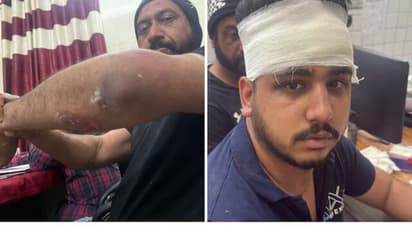Colonel Pushpinder Singh Bath assault case: Punjab's stability hinges on Army-police unity, not division

Synopsis
The brutal assault on Colonel Pushpinder Singh Bath and his son by Punjab Police officers in Patiala underscores the urgent need for Army-Police unity and transparent justice.
The violent assault on Colonel Pushpinder Singh Bath and his son, Angad Singh, on the night of March 13–14, 2025, in Patiala, brought to the fore some troubling tensions between key security institutions entrusted with maintaining Punjab's stability.
It has created the need to reinforce the message that Army-Police unity, not division, is the path to stability in Punjab, a state located along the India-Pakistan border.
First, an in-depth look at what happened.
The Patiala Incident
Dining at a roadside eatery near Rajindra Hospital, Colonel Bath and his son faced a sudden, aggressive confrontation when twelve Punjab Police officers in plainclothes demanded they relocate their parked vehicle.
When Colonel Bath objected to the officers' abusive demeanour, it triggered a brutal escalation of violence.
For nearly 45 harrowing minutes, father and son endured a merciless assault, leaving the Colonel with a fractured arm, facial injuries, and severe trauma to his back. His son sustained significant head injuries while bravely trying to shield his father.
The brutality was compounded by the officers' confiscation of Colonel Bath's government-issued identification and mobile phone, accompanied by chilling threats of staged encounters.
Initial medical care at Rajindra Hospital soon necessitated transfer to a military facility in Chandimandir due to the extent of their injuries.
Yet perhaps equally disturbing was the initial response from the authorities. The family's attempts to lodge a First Information Report (FIR) were inexplicably ignored. Instead, authorities chose to record a lesser charge of 'affray', based solely on a complaint from the eatery's owner, further inflaming public anger.
Only after intense public outrage and intervention from Punjab Governor Gulab Chand Kataria was a more accurate and severe FIR registered—eight days later— explicitly naming the accused policemen. The Punjab and Haryana High Court rightly condemned the delay while sharply questioning why the police hesitated to act despite clear medical evidence.
Imperative for Transparent Justice
This grave miscarriage of procedural justice demands immediate and transparent corrective measures. Suspending and transferring the implicated officers and forming a Special Investigation Team (SIT) represented necessary initial steps.
Nevertheless, lingering concerns about the impartiality of a Punjab Police-led probe compelled Colonel Bath to request an investigation by the Central Bureau of Investigation (CBI), supported by Defence Minister Rajnath Singh.
In response, the Punjab Police moved swiftly to demonstrate fairness. All 12 accused personnel were promptly suspended and transferred away from Patiala to preserve the integrity of the investigation.
Additionally, departmental proceedings for substantial disciplinary action commenced against these officers.
A high-level SIT, spearheaded by Senior Superintendent of Police Sandeep Malik and Superintendent of Police Manpreet Singh, began conducting daily investigations with transparency.
Punjab Director General of Police Gaurav Yadav publicly assured strict accountability, reinforcing respect toward the Indian Army to mitigate further institutional friction.
Dispelling Misconceptions
However, amid justified demands for justice, dangerous misinformation has spread about the incident. Multiple users on social media platforms like X and WhatsApp falsely alleged that the Army had abandoned Colonel Bath during a recent court hearing.
The truth is procedural rather than conspiratorial: Colonel Bath's petition seeking a CBI inquiry was filed privately against the State of Punjab, meaning the Army was neither named nor legally able to intervene during proceedings.
High Court protocol clearly dictates that only explicitly named parties have the right to representation in court. Had the Union of India or the Army been named respondents, their explicit support for an impartial investigation— including one by the CBI— could have been formally voiced.
Nevertheless, an Army officer from Western Command was present in uniform, silently yet significantly symbolising institutional solidarity.
Equally misleading were claims about a disproportionate Punjab Police presence at the courthouse.
Court No. 62, primarily handling criminal matters, routinely witnesses substantial police attendance. Although 10–15 officers were present, only two or three senior officers specifically represented the Punjab Police regarding Colonel Bath's case. The remainder attended unrelated cases scheduled that day.
It is known that Western Command continues closely monitoring the case, ready to formally represent its stance if legally impleaded. Misinterpretations suggesting Army apathy are, therefore, completely misguided.
To counteract such misinformation effectively, clear, proactive messaging from both the Army and Punjab Police is essential. Joint public statements and transparent crisis communication can significantly reduce misunderstanding and prevent institutional divisions from worsening.
Restoring Institutional Trust
Ultimately, the SIT's inquiry into the assault on Colonel Bath must be rapid, transparent, and impartial. Delivering swift and fair justice will reaffirm that no individual or institution operates above the law. Punjab's stability depends profoundly on mutual respect and unity between the Army and Police.
Let us transform this distressing incident into a renewed commitment to solidarity and proactive institutional dialogue. Punjab, and indeed the nation, deserves nothing less.
(Maj Gen. AK Chaturvedi (Retd) is the acting Chairman of STRIVE India, Think Tank, Lucknow.)
Stay updated with the Breaking News Today and Latest News from across India and around the world. Get real-time updates, in-depth analysis, and comprehensive coverage of India News, World News, Indian Defence News, Kerala News, and Karnataka News. From politics to current affairs, follow every major story as it unfolds. Get real-time updates from IMD on major cities weather forecasts, including Rain alerts, Cyclone warnings, and temperature trends. Download the Asianet News Official App from the Android Play Store and iPhone App Store for accurate and timely news updates anytime, anywhere.